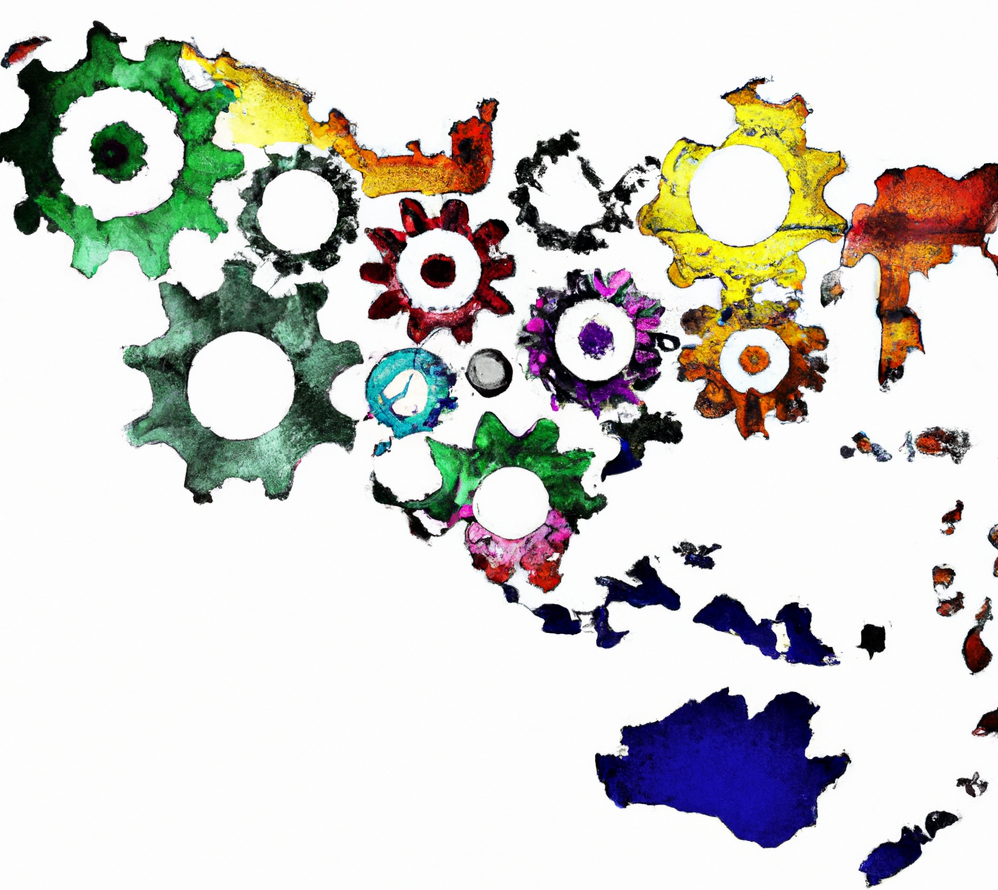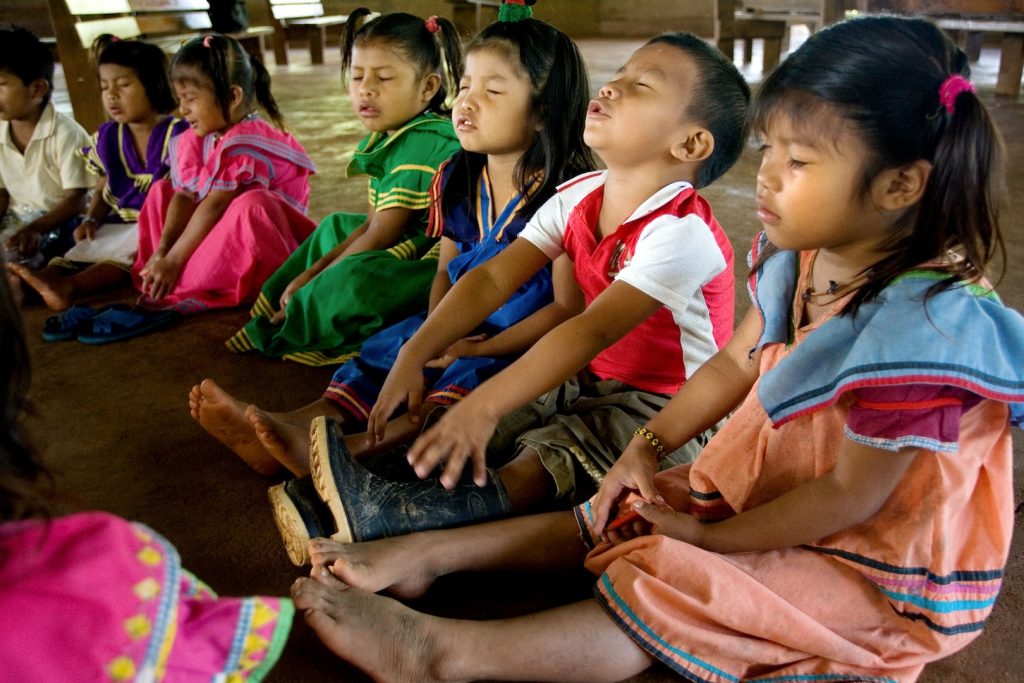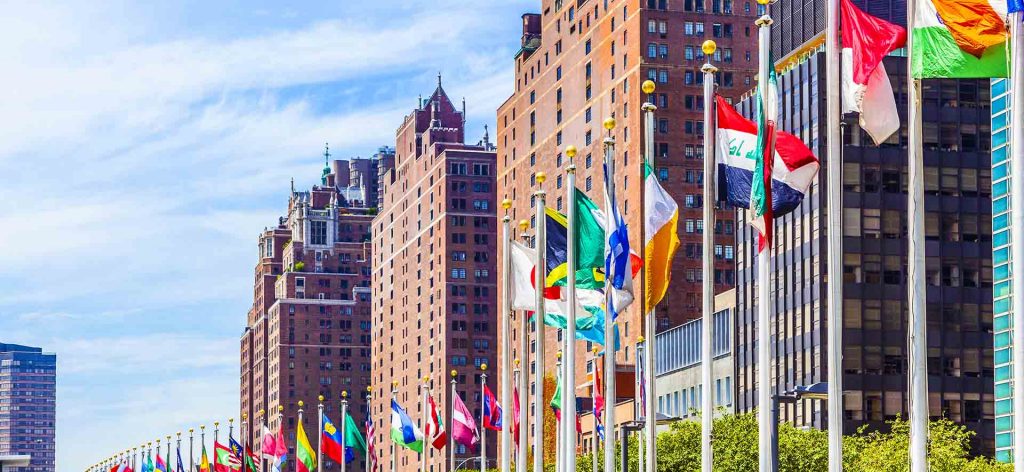Governance from a Bahá’í perspective
featured image | The Bahá’í World Center in Haifa, Israel
International Environment Forum
Geneva, Switzerland
It may seem odd that a biologist would devote much of his professional life to issues of governance, especially when the roots of that interest are spiritual. However, for those who have some acquaintance with the Bahá’í Faith, a religion where principles of governance are a foundation for achieving the unity of all humanity, this result is rather logical, and even coherent. For me, there has never been a separation between my beliefs and my professional life in science, science for policy, and international governance. Science and religion are two complementary and mutually-reinforcing knowledge systems.
Recently, my efforts have addressed reforming the whole system of global governance drawing on the Bahá’í vision of a global civilisation with unity in diversity. With two Bahá’í colleagues we prepared proposals for the reform of the UN system, which won the New Shape Prize in 2018 and led to a book “Global Governance and the Emergence of Global Institutions for the 21st Century” (Lopez-Claros, Dahl and Groff 2020), and the creation of a Global Governance Forum and a Climate Governance Commission. For the latter, another Bahá’i and I drafted proposals for a Global Environment Agency (Karlsson-Vinkhuyzen and Dahl 2021) that became a source for the UN High Level Advisory Board on Effective Multilateralism. This responds to the widespread calls for a fundamental transformation in society.
The challenges of governance today
We are stuck in the trap of national sovereignty, where each nation thinks first of itself and pursues its national interest on the world stage. Even international organisations like the UN have national sovereignty inscribed in their charters. This global anarchy gives full play to the egotistical and power-hungry. It is reinforced by the bankruptcy of political systems at the national level. When government fails to deliver security, well-being, justice and equity to the people, pressures build for change and create civil unrest, opening the door to autocratic rulers, if not failed states.
 In addition, governments themselves have been sidelined by the growing power of actors in the economic system that have escaped from national regulation and taxation. Through this system, powerful multinational corporations and financial institutions now control the main levers of power and information at the global level, preventing any efforts to interfere with their projects of economic exploitation to maximize their profits. This feeds corruption, since the materialist value system is driven by greed, lust, indolence, pride and violence, and only pays lip service to higher ethical principles.
In addition, governments themselves have been sidelined by the growing power of actors in the economic system that have escaped from national regulation and taxation. Through this system, powerful multinational corporations and financial institutions now control the main levers of power and information at the global level, preventing any efforts to interfere with their projects of economic exploitation to maximize their profits. This feeds corruption, since the materialist value system is driven by greed, lust, indolence, pride and violence, and only pays lip service to higher ethical principles.
These failures of governance have moral roots, and the solution must first be sought at that level (Dahl 2016). Without the right education, our ego and selfish desires dominate. In the absence of any higher purpose, it is easy to be selfish and aggressive, and for many, “you can’t change human nature”. Corruption is an expression of this, as are war, crime, dictatorships and the many other ways that self-interest is expressed in today’s world.
Bahá’í concepts of governance
For Bahá’ís, our material civilization needs to be balanced by a divine civilization based on spiritual principles, acknowledging our higher human purpose and fostering our spiritual evolution. The material side of life is there to give us the means to develop the infinite potential inherent in human consciousness.
Governance should therefore promote unity and justice. With our intensifying global interdependence, the aim today should be governance that reflects and fosters the organic unity of humanity. Our well-being will be achieved through integration and coordination, while appreciating our diversity, not uniformity. “Within human societies, diversity is a source of inspiration, creativity, productivity, resilience, innovation, and adaptation” (ISGP 2012). Justice should be the guiding principle, so that every individual has the opportunity to develop their full potential. Governance should acknowledge that every human being is a trust of the whole, and we have a collective trusteeship for the whole human race (ISGP 2012). In the terms of the UN 2030 Agenda, this means leaving no one behind.
At the most fundamental level, this calls for redefining and reconceptualizing power and authority, beyond self-interested and competitive expressions of power to unifying, cooperative, and mutualistic expressions of power. Bahá’ís propose an alternative concept of power and authority, that is democratic without competition and collective rather than individual. Elections to Bahá’í administrative institutions of nine members at the local, national and international levels are held without nominations, campaigning or partisanship, and those elected have an obligation to serve. Authority is exercised by these institutions through consultative decision-making in a search for truth with reference to spiritual principle. The local and national bodies are presently called Spiritual Assemblies, while the international governing body is the Universal House of Justice.
The members of these institutions are responsible to their own conscience and to God, rather than to those who elected them. There are no individual leaders, avoiding all the problems associated with the corrupting influence of individual power. The aim is loving empowerment, participation and accompaniment of those being administered. Bahá’ís see their system as an embryonic model to be adopted voluntarily when the world sees its advantages, acknowledging that it is not simply institutions and procedures, but that it depends on the requisite values, norms and commitments (ISGP 2012). While developing a system in which unity is the fundamental principle, Bahá’ís abstain from partisan politics, and are loyal to the government wherever they reside.
 New models of collective decision making, generally referred to as consultation, are the foundation of this system. This is not disputation and debate driven by ego, ideology, or interest-group competition. Bahá’í consultation seeks out a diversity of views in a search for the truth, in humble detachment and a spirit of service to the community, referring always to spiritual principles including justice and collective trusteeship. Bahá’í institutions are responsive to feedback from the community, while being shielded from manipulation by special interests. This system of consultation requires patience, maturity, and an attitude of humble learning (ISGP 2012).
New models of collective decision making, generally referred to as consultation, are the foundation of this system. This is not disputation and debate driven by ego, ideology, or interest-group competition. Bahá’í consultation seeks out a diversity of views in a search for the truth, in humble detachment and a spirit of service to the community, referring always to spiritual principles including justice and collective trusteeship. Bahá’í institutions are responsive to feedback from the community, while being shielded from manipulation by special interests. This system of consultation requires patience, maturity, and an attitude of humble learning (ISGP 2012).
While decision-making power and authority is exercised collectively and not by individual leaders, the Bahá’ís have a parallel set of institutions composed of individuals appointed to encourage and inspire the community, with specific functions of propagation and protection but with no responsibility for decision-making, who assist in the implementation of the plans adopted by the administrative institutions. The result is a wise separation of individual charismatic leadership and power.
Given the importance of diversity and subsidiarity in governance in a world of many nations, cultures, environments and economic situations, Bahá’ís operate a system of multilevel governance with Local and National Spiritual Assemblies in almost every country and the Universal House of Justice at the Bahá’í World Centre in Haifa, Israel. Each level has considerable autonomy, but decisions can always be appealed to the level above, and guidance and encouragement flow down from the upper levels.
Ultimately, the Bahá’í vision is of a world federal system with executive, legislative and judicial functions and mechanisms for collective security and the equitable distribution of the world’s resources. What form this will take still needs to be worked out. There are no simple formulas and no singular models, so new approaches to governance must evolve in a learning mode, with decisions tested against reality and revised or refined. Change is only possible as consciousness is raised among the masses of humanity, so progress will be gradual. Reflective learning requires unity, as in the Bahá’í spirit of consultation, and this is presently sabotaged by the culture of opposition and protest that is reacting to the dysfunction, corruption, and injustice in the present system (ISGP 2012).
Governance and human values
It is not enough to transform institutions if the people within them have not changed. This requires a transformation in education. Education is what allows culture, science, innovation and social cohesion to develop. It can cultivate the potentials available in each individual, including the emotional capacity for altruism, empathy, solidarity and cooperation, and the spiritual capacity for love, humility, forgiveness, volition, generosity, and self-effacement into a higher collective entity (Dahl 2016). It is this shared morality on which any society must be built, with values that contribute to social cohesion, that favour unity in diversity and leaving no one behind. Many people today, particularly among intellectuals, the young, and those from cultures that retain a sense of collective purpose, still hold to these values and despair at the destructive forces swirling around them, but the faltering or failure of many of the more progressive movements of the left shows that an intellectual attachment to human rights, solidarity, concern for the marginalized, and redistribution of wealth is not sufficient. Movements of the left are just as divided by ego, ambition and the struggle for power as those on the right.
To build capacities for effective governance, we need to educate for altruism and cooperation, and provide moral, intellectual and spiritual education from an early age. Governance requires virtues such as trustworthiness, honesty, integrity, selflessness and humility. In addition, education should develop capacities for self-expression, listening, drawing out the diverse views of marginalized groups, considering new perspectives, appreciating diversity, systematic inquiry, and elevating a discourse to the relevant moral and spiritual principles and being guided by them.

Education for good governance can also include the practical aspects: how to elect leaders with the right qualities, how to accompany others in service, having a work ethic of service, showing openness and inclusiveness, patience, flexibility, and resilience, and building mutual trust and respect free from backbiting (ISGP 2012).
What is often missing is a higher level of spiritual education and transformation in each individual. It is spiritual education that empowers every individual to refine their character and to contribute to an ever-advancing civilization. It is at this level that effective responsibility and accountability can be built into the institutions of society (Dahl 2015). Rich possibilities open up when scientific knowledge is combined with the second great knowledge system that is religion. All must learn to take spiritual principles and explore how they may shed new light on a difficult problem and suggest possible solutions.
Ways forward
Clearly the world is not going to find instant solutions to the challenges of global governance. Even at the national level, the social consensus on which governments have operated is now failing. Conflicting ideologies, fundamentalist, populist and xenophobic movements are growing, fanning the flames of disunity and conflict. The old dysfunctional systems must give way to allow new forms of governance and society to emerge from the ashes. Crisis and renewal is a natural mechanism for change, as evidenced by the wars that led to the League of Nations and the United Nations. The coming transition to an effective global system may well be traumatic.
 The logical response is to work for spiritual renewal from the bottom up. The Bahá’ís will continue to work on their alternative system to be able to offer it as a possible model when the world is ready to listen. The best protection against future crises will be a strong sense of solidarity at the community level. If a community or neighbourhood has developed children’s classes to teach basic virtues and moral values, accompanies its junior youth in adopting their own framework of values and discovering the satisfaction of acts of service to the community, and holds devotional meetings and study circles on spiritual themes to help people find shared spiritual perspectives in all their diversity, it will have the capacity to consult together about any challenges it may face and to find local solutions and ways forward. An organic process of governance at the grassroots will empower people for change to everyone’s benefit.
The logical response is to work for spiritual renewal from the bottom up. The Bahá’ís will continue to work on their alternative system to be able to offer it as a possible model when the world is ready to listen. The best protection against future crises will be a strong sense of solidarity at the community level. If a community or neighbourhood has developed children’s classes to teach basic virtues and moral values, accompanies its junior youth in adopting their own framework of values and discovering the satisfaction of acts of service to the community, and holds devotional meetings and study circles on spiritual themes to help people find shared spiritual perspectives in all their diversity, it will have the capacity to consult together about any challenges it may face and to find local solutions and ways forward. An organic process of governance at the grassroots will empower people for change to everyone’s benefit.
The ultimate solution to the multiple challenges threatening us today is to reinforce the spiritual foundations of society, to help every willing individual to begin the process of internal change, and each community to launch itself on a collective process of transformation. Only in this way can we rebuild, from the bottom up, solid ethical foundations for the institutions of the world society that must emerge from this age of frustration and transition.
REFERENCES
Dahl, Arthur, 2015. Personal and professional accountability: an ethical challenge. Presented in the International Environment Forum side event on “Principles of Accountability for Climate Change Agreements” at the UN Conference on Climate Change (COP21), Paris, France, 10 December 2015. https://iefworld.org/ddahl15h
Dahl, Arthur Lyon. 2016. Corruption, Morality and Religion. Blog post on International Environment Forum. https://iefworld.org/ddahl16l
ISGP. 2012. Reflections on Governance. Institute for Studies in Global Prosperity, Bahá’í International Community. Bahá’í World Centre, Haifa, Israel, 21 July 2012. http://www.globalprosperity.org/documents/ISGP_Reflections_on_Governance.pdf
Karlsson-Vinkhuyzen, Sylvia and Arthur Lyon Dahl. 2021. Towards a Global Environment Agency: Effective Governance for Shared Ecological Risks. A Climate Governance Commission Report. Stockholm: Global Challenges Foundation. 77 p.
Lopez-Claros, Augusto, Arthur L. Dahl and Maja Groff. 2020. Global Governance and the Emergence of Global Institutions for the 21st Century. Cambridge: Cambridge University Press. 545 pages. doi:10.1017/9781108569293





